
BULLETIN OF THE COUNCIL FOR RESEARCH IN MUSIC EDUCATION
Scope & Guideline
Fostering Scholarly Inquiry in Music Education
Introduction
Aims and Scopes
- Diversity and Inclusion in Music Education:
The journal focuses on the experiences and challenges faced by diverse groups within music education, including racial and ethnic minorities, LGBTQ+ individuals, and students with disabilities. This includes exploring identity trauma, cultural competence, and the role of music educators in fostering inclusive environments. - Pedagogical Innovation and Technology Integration:
Research on innovative teaching practices and the integration of technology into music education is a core focus. This includes studies on mobile adaptation, online teaching experiences during the COVID-19 pandemic, and the effects of creative pedagogical approaches on student engagement and learning. - Collaborative and Community-Based Music Practices:
The journal emphasizes collaborative learning and community engagement in music education, exploring how music can serve as a vehicle for social change and citizenship education. This includes investigations into youth orchestras, community choruses, and the role of music in addressing social issues. - Assessment and Evaluation in Music Education:
A significant area of research includes the assessment practices within music education, focusing on teacher perceptions, student evaluations, and the development of assessment tools. This research aims to enhance the effectiveness of music teaching and learning through evidence-based evaluation. - Theoretical and Empirical Investigations of Music Learning:
The journal publishes both theoretical frameworks and empirical studies that investigate various aspects of music learning, including cognitive processes, creativity, and the impact of cultural traditions on musical development.
Trending and Emerging
- Social Justice and Advocacy in Music Education:
An increasing number of studies are focusing on social justice issues within music education, including anti-racist practices, advocacy for marginalized communities, and the role of music in promoting social change. This theme underscores the importance of equity and representation in music education. - Impact of Technology on Music Education:
The integration of technology in music education has become a significant focus, especially in light of the challenges posed by the COVID-19 pandemic. Research is exploring how technology can enhance teaching and learning experiences, including online education and digital tools for music composition. - Mental Health and Well-Being of Music Educators:
Research examining the mental health challenges faced by music educators, particularly those from marginalized identities, is gaining momentum. This theme highlights the importance of addressing mental health and well-being within the music education community. - Culturally Relevant Pedagogy:
There is a growing emphasis on culturally relevant teaching practices that honor and incorporate students' diverse backgrounds and experiences into music education. This trend reflects a broader shift towards inclusivity and relevance in music curricula. - Creative and Collaborative Learning Approaches:
Emerging research is focusing on creative problem-solving and collaborative learning in music education. This includes studies on how these approaches foster creativity, enhance student engagement, and promote deeper learning experiences in music.
Declining or Waning
- Traditional Music Education Methods:
There is a noticeable decline in research focusing solely on traditional methods of music teaching, such as standard instrumental techniques and classical pedagogy. As the field embraces more diverse and innovative practices, traditional approaches are being overshadowed. - General Music Education without Contextualization:
Research that treats general music education as a standalone subject, without connecting it to broader social, cultural, or technological contexts, is becoming less frequent. There is a growing emphasis on situating music education within specific community and cultural frameworks. - Focus on Standardized Testing in Music Education:
The emphasis on standardized testing and traditional assessment methods in music education appears to be waning. Researchers are increasingly advocating for alternative assessment approaches that consider creativity and individual student growth rather than standardized metrics. - Historical Perspectives on Music Education:
Research that solely focuses on historical perspectives or the evolution of music education practices is declining. The current trend favors contemporary issues, innovative practices, and practical applications over historical analysis. - Solo Performance Emphasis:
There is a decreasing focus on solo performance as the primary measure of musical success. The trend is shifting towards collaborative music-making and ensemble participation, reflecting a broader understanding of music's social nature.
Similar Journals

Research Studies in Music Education
Catalyzing Critical Discourse in Music EducationResearch Studies in Music Education is a prestigious peer-reviewed journal published by SAGE Publications Ltd, dedicated to advancing the field of music education through innovative research and critical discourse. With an ISSN of 1321-103X and an E-ISSN of 1834-5530, this journal has been a vital resource for academics since its inception in 1993, and continues to serve as a platform for high-quality scholarship aimed at fostering excellence in music education practices worldwide. The journal's impressive Q1 ranking in Music and Q2 in Education for 2023, along with a Scopus rank of #11 out of 180 in the Arts and Humanities category, underscores its significance and influential presence within the academic community. Although it operates under traditional publishing models, readers can expect to encounter a wealth of knowledge that reflects current trends, methodologies, and insights in the realms of music teaching and learning. The journal not only aims to enrich the discourse in music education but also supports researchers, educators, and students in their endeavors to improve musical understanding and pedagogy.
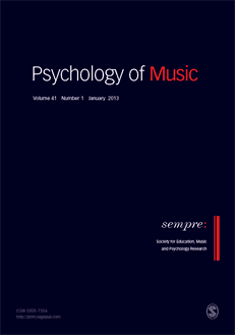
Psychology of Music
Fostering Connections Through Music and MindPsychology of Music is a prominent academic journal published by SAGE Publications Inc, focusing on the interdisciplinary field that bridges psychological principles and musical expression. Established in 1973, this esteemed journal plays a crucial role in advancing understanding of how music affects emotions, cognition, and social interactions, thus catering to a diverse audience of researchers, educators, and practitioners in both psychology and music. With an impressive impact factor that places it in the Q1 category for Music and Q2 for Psychology (miscellaneous) in 2023, this journal ranks 3rd out of 180 in Arts and Humanities – Music, and 19th out of 97 in Psychology (miscellaneous) according to Scopus metrics, affirming its authoritative contribution to the field. The Psychology of Music is essential for those looking to explore cutting-edge research, methodologies, and applications, providing rich insights and fostering discussions that reach into music therapy, education, and psychological wellness. Although it is not an open-access journal, its high-quality peer-reviewed articles are pivotal for anyone dedicated to the intricate relationship between music and the mind, making it a must-read for professionals and students alike.

Metodicki Ogledi-Methodical Review
Cultivating Scholarly Discourse Across DisciplinesMetodicki Ogledi-Methodical Review is a distinguished academic journal published by the Croatian Philosophical Society, specializing in the fields of Education and Philosophy. With an ISSN of 0353-765X and an E-ISSN of 1848-2325, the journal serves as a vital platform for scholarly discourse and research dissemination from Croatia and beyond. Although currently positioned in the Q4 category in Education and Q3 in Philosophy, Metodicki Ogledi plays a crucial role in fostering interdisciplinary dialogue, combining pedagogical insights with philosophical inquiries. It has achieved a Scopus rank of #341 out of 806 in Philosophy and #1306 out of 1543 in Education, highlighting its relevance in the academic community. The journal's ongoing commitment to publishing quality research from 2017 to 2024 ensures it remains a significant resource for researchers, educators, and students seeking to enhance their understanding of methodical practices within these fields. While the journal currently does not offer open access options, its curated articles are pivotal for advancing knowledge in educational methodologies and philosophical thought.
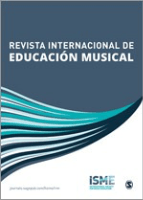
Revista Internacional de Educacion Musical
Connecting researchers and practitioners for a harmonious educational landscape.Revista Internacional de Educacion Musical, published by SAGE PUBLICATIONS LTD, is a prestigious journal dedicated to advancing the field of music education on a global scale. With an ISSN of 2307-4841, this journal serves as a vital platform for researchers, educators, and practitioners in music pedagogy, offering a wide array of peer-reviewed articles, theoretical discussions, and empirical studies. The journal aims to promote interdisciplinary dialogue and innovative practices within music education, emphasizing the importance of cultural diversity and contemporary educational methodologies. As part of SAGE Publications, known for its commitment to excellence in scholarly dissemination, the Revista Internacional de Educacion Musical plays a crucial role in shaping future trends and policies in music education. By fostering access to high-quality research, this journal is invaluable for those dedicated to enhancing the teaching and learning of music in educational contexts.

TEACHING OF PSYCHOLOGY
Exploring Cutting-edge Approaches in Psychology InstructionTEACHING OF PSYCHOLOGY is a distinguished academic journal published by SAGE Publications Ltd, focusing on the field of psychology education. Established in 1975, this journal has carved out a vital niche in the academic landscape, facilitating the dissemination of innovative teaching practices, research outcomes, and pedagogical strategies that enhance the learning experience in psychology. With an impressive H-index indicating its influence, TEACHING OF PSYCHOLOGY is ranked in the second quartile for Education and third quartile for Psychology (Miscellaneous) in 2023, reflecting its pivotal role in these fields. The journal boasts a robust Scopus ranking, placing it within the 55th percentile for Social Sciences - Education and the 42nd percentile for General Psychology, demonstrating its relevance and reach among scholars and practitioners alike. Although it does not offer open access, it remains a crucial resource for educators, researchers, and students seeking to enhance their understanding and application of psychological principles in educational settings. By contributing to the ongoing dialogue about effective teaching methodologies in psychology, the journal aims to inspire and inform educators, fostering an environment of rigorous academic inquiry and practical application.

ADVANCES IN HEALTH SCIENCES EDUCATION
Cultivating Expertise in Health Sciences EducationADVANCES IN HEALTH SCIENCES EDUCATION, published by SPRINGER, is an esteemed journal that stands at the forefront of educational research within the health sciences domain. With its ISSN 1382-4996 and E-ISSN 1573-1677, this journal has established itself as a vital resource for those committed to improving medical and health education. As a Q1 journal in both Education and Medicine (miscellaneous) categories in 2023, it boasts a prestigious standing in its field, ranked in the 91st percentile among the top educational journals on Scopus, firmly placing it within the global academic discourse. Aimed at researchers, professionals, and students, the journal publishes high-quality articles that promote innovation and best practices in health sciences education, reflecting a commitment to enhancing teaching and learning practices. With coverage from 1996 to 2024, it continues to provide a robust platform for progressive educational strategies in health. For those looking to advance their understanding of educational methodologies in health care, ADVANCES IN HEALTH SCIENCES EDUCATION remains an indispensable resource.
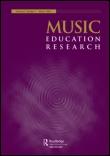
Music Education Research
Shaping the Landscape of Music EducationMusic Education Research is a prestigious journal dedicated to advancing scholarship in the field of music education, published by Routledge Journals, Taylor & Francis Ltd. With a significant impact factor reflected in its Q1 ranking in Music and Q2 in Education for 2023, this journal is a critical resource for researchers, educators, and practitioners alike. It consistently ranks high in both the Arts and Humanities and Social Sciences categories, with an impressive position of Rank #8 in Music out of 180 journals, indicating its influence in shaping contemporary discourse. Aimed at fostering innovation and critical examination within music education, Music Education Research invites submissions that explore a broad spectrum of topics, encompassing pedagogical practices, policy implications, and curriculum development. Operating from the United Kingdom, the journal provides a vital platform for sharing cutting-edge research and is committed to improving music learning experiences across various educational contexts.

Teaching of Mathematics
Empowering Educators with Cutting-Edge Pedagogical InsightsTeaching of Mathematics is an esteemed open-access journal devoted to the field of mathematics education, published by DRUSTVO MATEMATICARA SRBIJE in Serbia. Since its inception in 1998, the journal aims to foster scholarly dialogue and disseminate research findings that contribute to the effective teaching and learning of mathematics. Although it currently holds a Q4 ranking in both Education and Miscellaneous Mathematics categories, the journal is dedicated to providing a platform for innovative pedagogical strategies, theoretical discussions, and empirical studies. With an ISSN of 1451-4966 and an E-ISSN of 2406-1077, Teaching of Mathematics offers open access to its content, ensuring that researchers, educators, and students can freely benefit from its contributions. As it converges towards 2024, the journal aspires to enhance its impact and influence within the mathematical education community, encouraging all stakeholders to share their insights and advancements in this critical area of study.
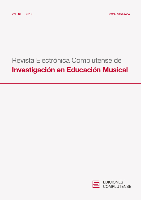
Revista Electronica Complutense de Investigacion en Educacion Musical-RECIEM
Advancing Music Education Research for a Global AudienceRevista Electronica Complutense de Investigacion en Educacion Musical (RECIEM) is a distinguished open-access journal published by UNIV COMPLUTENSE MADRID, SERVICIO PUBLICACIONES, dedicated to advancing research in the fields of music education and pedagogy. Since its inception in 2004, RECIEM has provided a vital platform for scholars, educators, and researchers to disseminate their findings and foster discussions that bridge the gap between theory and practice in music education. With an impressive ranking in the top quartile for music (Q1) and a respectable Q3 ranking in education for 2023, RECIEM is a pivotal resource for those engaged in the interdisciplinary nexus of arts and education. The journal's commitment to open access ensures that its scholarly content is available to a global audience, enhancing its impact and fostering collaboration among professionals in the music education community. The journal covers diverse topics within music and education, aiming to inspire innovation and reflect contemporary developments in teaching methodologies and musicological research. RECIEM’s continued growth—represented by its robust Scopus ranks and the convergence of years from 2004 to 2024—underscores its relevance and significance in shaping the future of music education research.
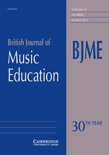
British Journal of Music Education
Shaping the Future of Music Learning and TeachingBritish Journal of Music Education is a prestigious academic publication dedicated to advancing the field of music education. Published by Cambridge University Press, it benefits from a notable impact factor that positions it in the Q2 category in Education and the Q1 category in Music as of 2023. This journal serves as a vital platform for researchers, educators, and students alike, focusing on innovative research, pedagogical studies, and theoretical discussions that shape the practice of music education globally. Since its inception in 1984, the journal has contributed significantly to the understanding of music pedagogy and continues to be relevant and influential, currently spanning the years from 1984 to 1998 and 2007 to 2024. With impressive rankings, including rank #16/180 in Arts and Humanities (Music) and rank #669/1543 in Social Sciences (Education) on Scopus, it highlights the journal's commitment to scholarly excellence. Though it does not currently offer open access, its contributions are an essential resource for anyone involved in the education landscape of music.